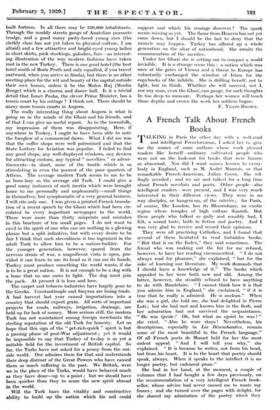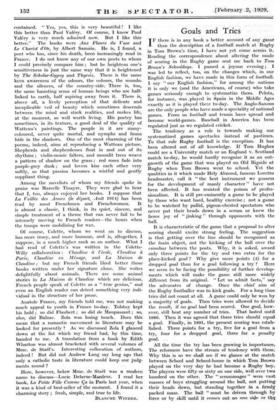A French Talk About French Books
TALKING in Paris the other day with a well-read- and intelligent Frenchwoman, I asked her to give. me the names of some authors whose work pleased readers like herself—ordinary cultivated people who were not on the look-out for books that were bizarre or abnormal. Nor did I want names known to every- body in England, such as M. Andre Maurois, or that remarkable French-American, Julian Green. She wil- lingly acceded ; and we sat and talked for a long time about French novelists and poets. Other people—also intelligent readers—were present, and I was very much interested in their different views. They were in no way disciples, or hangers-on, of the coteries; for Paris, of course, like London, has its Bloomsbury, an exotic region where temples of high culture flourish. But these people who talked so gaily and sensibly had, I felt, a sound taste, both in fiction and poetry. And I was very glad to receive and record their opinions.
They were all practising Catholics, and I found that several of them hesitated to read forbidden books.
" But that is on the Index," they said sometimes. The friend who was making out the list for me refused, however, to have her reading circumscribed. " I do not always read for pleasure," she explained, " but for the sake of learning our literature. My work demands that I should have a knowledge of it." The books which appealed to her were both new and old. Among the latter, however, she steadily refused to have anything to do with Baudelaire. " I cannot think how it is that you admire- him in England," she exclaimed, " if it is true that he really is admired. He is unclean." When she was a girl, she told me, she had delighted in Pierre Loti ; but she had met and known him in the flesh, and her admiration had not survived the acquaintance. " He was egoiste ! Oh, but what an egoist he was ! "
she cried. " Also he wore stays ! Nevertheless, his descriptions, especially in Les Desenchantees, remain some of the most beautiful in the French language."
Of all French poets de Musset held for her the most ardent appeal. " And I will tell you why," she explained. " It is because he writes, not from his head, but from his heart. It is to the heart that poetry should speak, always. When it speaks to the intellect it is no longer poetry, but cadenced prose."
She had in her hand, at the moment, a couple of volumes that I had bought a few days previously, on: the recommendation of a very intelligent French book- seller, whose advice had never caused me to waste my. francs ; and she turned over the pages with delight, for, she shared my admiration of the poetry which they contained. " Yes, yes, this is very beautiful ! I like this better than Paul Valery. Of course, I know Paul Valery is very much admired now. But I like this better." The books were Auv Planes du Vase and Le Chariot d'Or, by Albert Samain. He is, I found, a poet who has, since his death, been increasingly read in France. I' do not know any of our own poets to whom I could precisely compare him ; but he heightens one's sensitiveness in just the same way that it is heightened by The Scholar-Gypsy and Thyrsis. There is the same keen awareness of the odours, the colours, the sounds, and the silences, of the country-side. There is, too, the same haunting sense of human beings who are half- linked to earth, half aspiring away from it. There is, above all, a lively perception of that delicate and inexplicable veil of beauty which sometimes descends between the mind and stark realities, and makes life, at the moment, so well worth living. His poetry has sometimes, in its texture, a good deal of the quality of Watteau's paintings. The people in it are many- coloured, never quite mortal, and nymphs and fauns hide in the shadows. One of the most charming of the poems, indeed, aims at reproducing a Watteau picture. Shepherds and shepherdesses float in and out of its rhythms ; violin-music falters, and moonlit trees weave a pattern of shadow on the grass ; red roses fade into purple-grey dusk ; and lovers kiss each other very softly, so that passion .becomes a wistful and gently suppliant thing.
Among the novelists of whom my friends spoke in praise was Marcelle Tinayre. They were glad to hear that I, too, always enjoyed her books. I suppose that La Veil& des Armes (le depart, Aout 1914) has been read by most Frenchmen and Frenchwomen. It is almost a classic, I think, in its quiet, sincere, and simple treatment of a theme that can never fail to be intensely moving to French readers—the hours when the troops were mobilizing for war.
Of course, Colette, whom we went on to discuss, has more irony, and more humour, and is, altogether, I suppose, in a much higher rank as an author. What I had read of Colette's was written in the Colette- Willy collaboration : Claudine a l'ecole, Claudine a Paris, Claudine en Menage, and La liaison de Claudine ; but my French friends liked better those books written under her signature alone. She writes delightfully about animals. There are some animal stories in La Maison de Claudine which are delicious. French people speak of Colette as a ". true genius," and even an English reader can detect something very indi- vidual in the structure of her prose.
Anatole France, my friends told me, was not making much appeal to youth in France to-day. Tolstoy kept his hold ; so did Flaubert ; so did de Maupassant ; so, also, did Balzac. Zola was losing touch. Does this mean that a romantic movement in literature may be looked for presently ? As we discussed Zola I glanced down at the list which my friend had, by this time, handed to me. A translation from a book by Edith Wharton was almost bracketed with several volumes of Mme. de Stael's. Interesting collocation of, authors, indeed ! But did not Andrew Lang say long ago that only a catholic taste in literature could keep our judg- ments sound ?
Here, however, below Mme. de Stael was a modern name to discuss—Lucie Delarue-Mardrus. I read her book, La Petite File Comme ca in Paris last year, when it was a kind of best-seller of the moment. I found it a charming story ; fresh, simple, and true to life.
BLANCHE WINDER.









































 Previous page
Previous page